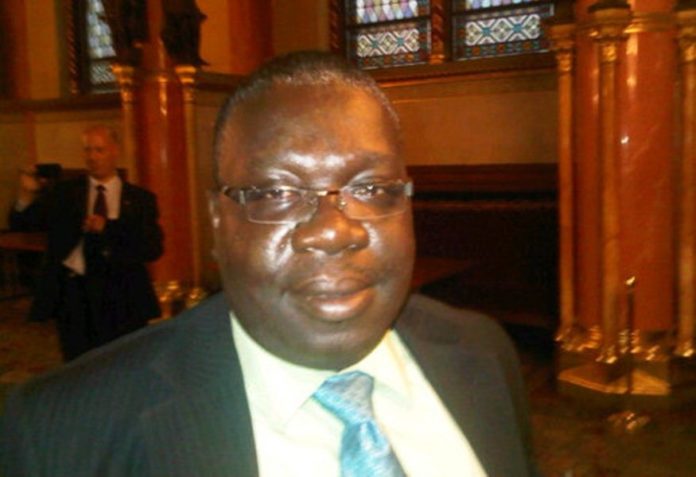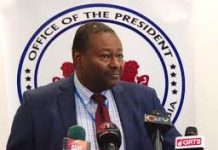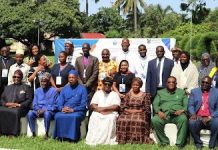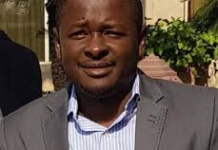By Yankuba Jallow & Kebba Jeffang
Hearing at the Truth, Reconciliation and Reparations Commission (TRRC) has started on Monday, January 07 with the testimony of the then Assistant Inspector General of Police Ebrima Chongan who narrated the circumstances surrounding the 22 July 1994 Coup led by former president Yahya Jammeh to remove elected president Dawda Kairaba Jawara.
Chongan who has been in exile in the United Kingdom for 21 years was initially a leading figure in Gambia’s Gendarmerie which was later changed to allow opting to join the Gambia National Army (GNA) or the Gambia Police Force (GPF).
He said he joined the Gendarmerie training on the 1 November 1982 and passed out in March 1983. He said he attended training in France in 1985 – upon return the following year he was promoted.
In 1993, he was promoted as Assistant Inspector General of Police, after the security design was changed from the French style Gendarmerie.
Five years before, he said, he was tasked to set up a territorial Gendarmerie that has a power of the police, noting that Gendarmerie was set up to compliment the effort of the police force.
Chongan said despite the Gendarmerie being a Gambian security apparatus, it was under the command of the Senegalese because of the existence of the Senegambian Confederation.
The concept of Gendarmerie was French and by virtue of the Confederation, it was created and commanded by Colonel Ndow Njie, he said.
He explained that the trainer for the Gendarmerie was a Senegalese and the Gambian president was guarded by the Senegalese Gendarmerie.
Chongan stated that after the fall of the Confederation, a Gambian commander took over. He said this was the time then president Jawara decided to bring in Nigerian soldiers – at a time when Nigeria was under military rule of Baba Ngida.
According to him, it was an advice of Nigeria for the president to disband the Gendarmerie, a system that its troops in the Gambia found difficult to cope with because it’s new to them.
“There was a big catastrophe that happened because of political reasons where the Gendarmerie was annexed by the Gambia Police Force,” he said.
To him, Jawara’s decision to appoint Nigerian officers to occupy all commanding roles in the security was a wrong move – a decision according to him created severe hit back.
“The security adviser to the president was a Nigerian. They advised the president to disband the Gendarmerie because they don’t have it in their political culture,” he said.
After the creation of GNA, some of the Gendarmerie officers joined the system because all those who were in Gendarmerie wanted to become soldiers – although some were taken to the police.
He said the biggest problems the security systems faced at the time was lack of morale and defined policy.
“The government brought in about 60 Nigerian soldiers and gave them accommodation and cars whereas the Gambia soldiers were not provided with such amenities.
“The relationship between senior Gambian officers and Nigerians wasn’t nice because GNA was commanded by foreigners. It was not nice,” he said.
This was a time when police personnel were more than the GNA, Chongan told the commission.
He said after the fall of Baba Ngida, his successor General Sani Abacha did not like Nigerian troop leader in the Gambia Commander Dada and therefore wanted him to be replaced. “So within them, there was command problem.”
In what could be the trigger of the coup, he said the Nigerian officers would tell “our young officers that if it was in Nigeria, they won’t allow foreigners to command.” He described the moment as ‘powder cake waiting to be exploded.’
Jawara’s leadership was slow in taking decision, he insinuated.
“As far as I am concerned the security council never met to discuss the issue,” he said, referring to the message spread from Nigerian camp.
“As police officers, we fear that if the soldiers of GNA revolt, we cannot stop them because they had more sophisticated weapons compared to the police,” he said.
Giving an account on what transpired on the 22nd July 1994, Chongan said after the rumour of the planned coup, he assembled the members of the police force and addressed them to be loyal to the government and defend the Constitution.
He said he notified the then IGP that the army are embarking on mutiny, who ordered them to resist.
“The IGP ordered us to resist and if necessary, we should to shoot to kill,” he said.
The Tactical Support Group which he said was the resisting forces were deployed to Denton Bridge, Bond Road and Gambia High to ensure no soldier passed.
He said to his surprise, he saw his own personnel he left at Denton Bridge joining coup makers.
“I opened fire at the coup makers and I stopped because all those I was with, none of them fired. There was no return fire from the soldiers,” he said.
He explained that he stopped a private car and returned to the police headquarters.
“I did not blame the support staff because they were not trained like us. We have undergone a military training,” he said.
He mentioned Captain Momodou Sonko as one who came to the headquarters with soldiers heavily armed and told him that the soldiers were successful in overthrowing the thirty-year-old Jawara government.
“Sonko told me that Captain Suwareh and Lang Tombong Tamba have both joined the coup makers. Suwareh and the coup makers later came to the police headquarters. Yahya Jammeh was holding a rifle and they disconnected the telephone communication,” he said.
Chongan said he and the IGP were arrested on the 25 July 1994 and taken to Mile 2 prisons security room number 4 under the instruction of Sana Sabally in the presence of Sadibou Hydara. He described the cells as solitary confinement with a wooden plank that served as bed.
“I was detained for a month without taking bath. The rats and mosquitoes were our neighbours. I never see an aggressive rat at except Mile 2,” he said.
He said he knows Yahya Jammeh as they both attended Gambia high school but his grade was above Jammeh. And he trained Jammeh as the instructor of training school at the time. He said they were neighbours in Fajara as well when he usually assisted Jammeh with food and money.
Chongan described Jammeh as a rough and indiscipline character saying, he knew that Gambia will be in a problem the moment Jammeh took over the state of affairs.
He told the commission that in his long detention, he was never charged neither was he told why he was detained.
However, he said they accused him of stealing a rake and a wheelbarrow as well as stealing 4,000 dalasi – and he was charged.
He produced Decree Number 3 which was a decree that listed 29 officers to be detained.
“My name was at number 25. I received the detention order on the 5 September 1994 and it was backdated,” he said. It was on the same day when all the security detainees were moved to the Security Wing Number 4 and prison warden, Jobarteh also joined us,” he recalled.
He explained that at around 1 to 2 am, Sadibou Hydara, Sanna Sabally, Edward Singhateh, Yankuba Touray, and many other soldiers came into the Security Wing and Edward Singhateh was saying ‘where is Captain Momar O Cham’.
He said when Momar Cham’s cell was identified, he was attacked and beaten by the soldiers and later we heard gunshots. He added that he himself was later handcuffed and beaten by the soldiers. He also said that Yankuba Touray pointed a gun into his mouth and he was putting a device connected to the gun on and off. “At this time, I gave up for life,” he adduced.
According to the witness, on the 27 January 1995, a group of soldiers headed by Edward Singhateh brought in Sanna Sabally and Sadibou Hydara, as well as Baboucar Sanyang as detainees and they, were taken to Security Wing 1.
“On the 29 January, Sabally, Hydara, and Sanyang were tortured severely because we could hear their cries. On about the 5 of February, they were tortured again and this time they came with gadgets,” he said.
He said for seven months in detention, he couldn’t have access to his family until when his wife was allowed to see him on the 12 of February 1995.
He said he went out from prison in February 1997 and then moved to United Kingdom to seek asylum through Dakar.
Chongan is expected to appear today for the continuation of his testimony at 10am.




















